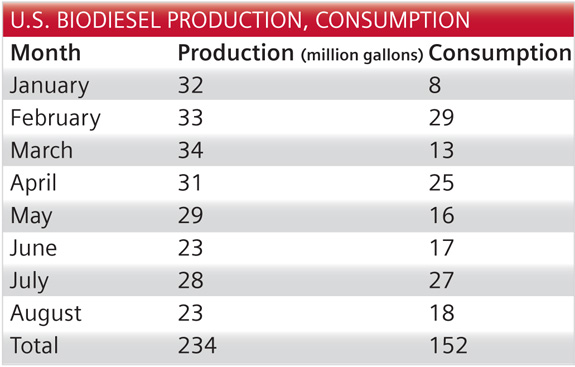Chairing the Solution



December 20, 2010
BY Luke Geiver
Congress isn't the only operation boasting the promise and renewed vigor of a few new faces. The National Biodiesel Board recently elected new leadership, including Renewable Energy Group Inc.'s very own Gary Haer, as chairman. Haer spoke with Biodiesel Magazine on the first day of his new appointment. We (as in biodiesel) are part of the energy solution, and everyone in Washington needs to know that, he says. As the new chairman, Haer explains that NBB's perspective for the near-term future also involves communicating to the petroleum industry that biodiesel is the solution for biomass-based diesel and for advanced biofuels required by RFS2.
"The future looks very good for us," he says. "The RFS represents a base of demand that we've never had before as an industry. That is going to be very beneficial to the biodiesel producers in the U.S." Haer cites several existing champions of the industry in Washington, but unfortunately, some of them will be ushered out when the new Congress takes hold. Advocates Rep. Earl Pomeroy, D-N.D., and Sen. Blanche Lincoln, D-Ark., both praised by Haer for their efforts in promoting and pushing for biodiesel, were defeated in the November elections. Sen. Chuck Grassley, R-Iowa, and Sen. Maria Cantwell, D-Wash., also labeled by Haer as champions, are back however, and will certainly be at the forefront again of the biodiesel tax incentive struggle.
As for the lapse in the credit and the misfortune seen by the U.S. industry in the past few months, Haer says it was just the focus of Congress at the time. "They are searching for ways to move legislation forward," he said, "and do it in a way that meets their requirements under Paygo. If there is an expenditure to the treasury, they have to find that money somewhere so that it is budget-neutral."
But what about the focus of a new Congress? It might be almost impossible to argue that the "pay as you go" method that Haer infers halted the tax credit in 2010 will cease to exist in 2011, and Haer isn't focused on that unlikely event. Instead, he provides a fresh point to consider when looking at the promise of the industry, and oddly enough, it has nothing to do with saving jobs. "I think that the reason the biodiesel tax credit should receive serious consideration going forward is because it represents jobs," but not the kind (lost jobs that could be restored) we are used to hearing about. While he does highlight the job-saving ability of a renewed incentive, for Haer, the incentive would provide room for something that once fueled the industry. "The tax incentive also represents a new industry, and it represents more opportunity for investment," he says.
"The future looks very good for us," he says. "The RFS represents a base of demand that we've never had before as an industry. That is going to be very beneficial to the biodiesel producers in the U.S." Haer cites several existing champions of the industry in Washington, but unfortunately, some of them will be ushered out when the new Congress takes hold. Advocates Rep. Earl Pomeroy, D-N.D., and Sen. Blanche Lincoln, D-Ark., both praised by Haer for their efforts in promoting and pushing for biodiesel, were defeated in the November elections. Sen. Chuck Grassley, R-Iowa, and Sen. Maria Cantwell, D-Wash., also labeled by Haer as champions, are back however, and will certainly be at the forefront again of the biodiesel tax incentive struggle.
As for the lapse in the credit and the misfortune seen by the U.S. industry in the past few months, Haer says it was just the focus of Congress at the time. "They are searching for ways to move legislation forward," he said, "and do it in a way that meets their requirements under Paygo. If there is an expenditure to the treasury, they have to find that money somewhere so that it is budget-neutral."
But what about the focus of a new Congress? It might be almost impossible to argue that the "pay as you go" method that Haer infers halted the tax credit in 2010 will cease to exist in 2011, and Haer isn't focused on that unlikely event. Instead, he provides a fresh point to consider when looking at the promise of the industry, and oddly enough, it has nothing to do with saving jobs. "I think that the reason the biodiesel tax credit should receive serious consideration going forward is because it represents jobs," but not the kind (lost jobs that could be restored) we are used to hearing about. While he does highlight the job-saving ability of a renewed incentive, for Haer, the incentive would provide room for something that once fueled the industry. "The tax incentive also represents a new industry, and it represents more opportunity for investment," he says.
Advertisement
Advertisement
Advertisement
Advertisement
Upcoming Events





